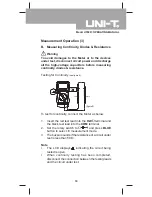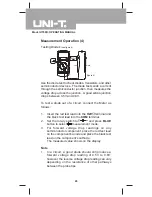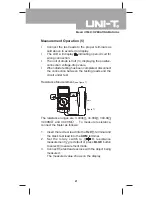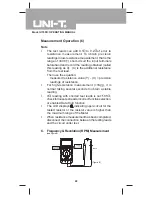
Rules For Safe Operation (2)
l
Disconnect circuit power and discharge all high-
voltage capacitors before testing continuity,
diodes, resistance or current.
l
Before measuring current, check the Meter’s
fuses and turn off power to the circuit before
connecting the Meter to the circuit.
l
Replace the battery as soon as the battery
indicator
appears. With a low battery, the
Meter might produce false readings that can
lead to electric shock and personal injury.
l
Remove test leads and RS232C interface cable
from the Meter and turn the Meter power off
before opening the Meter case.
l
When servicing the Meter, use only the same
m o d e l n u m b e r o r i d e n t i c a l e l e c t r i c a l
specifications replacement parts.
l
The internal circuit of the Meter shall not be
altered at will to avoid damage of the Meter and
any accident.
l
Soft cloth and mild detergent should be used to
clean the surface of the Meter when servicing.
No abrasive and solvent should be used to
prevent the surface of the Meter from corrosion,
damage and accident.
l
The Meter is suitable for indoor use.
l
Under the environment with high (+/-4kV)
electrostatic discharge, the Meter may not be
operated as normal condition. The user may
require resetting the Meter.
l
Turn the Meter power off when it is not in use
and take out the battery when not using for a
long time.
l
Constantly check the battery as it may leak when
it has been using for some time, replace the
battery as soon as leaking appears. A leaking
battery will damage the Meter.
Model UT60D: OPERATING MANUAL
7
Summary of Contents for UT60D
Page 40: ...Model UT60D OPERATING MANUAL 40 ...








































